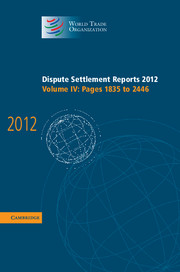Book contents
- Frontmatter
- Table of Contents
- United States - Measures Concerning the Importation, Marketing and Sale of Tuna and Tuna Products (WT/DS381)
- Table of Contents
- CASES CITED IN THIS REPORT
- ABBREVIATIONS USED IN THIS REPORT
- I INTRODUCTION
- II ARGUMENTS OF THE PARTICIPANTS AND THE THIRD PARTICIPANTS
- III ISSUES RAISED ON APPEAL
- IV BACKGROUND AND OVERVIEW OF THE MEASURE AT ISSUE
- V LEGAL CHARACTERIZATION OF THE MEASURE AT ISSUE
- VI ARTICLE 2.1 OF THE TBT AGREEMENT
- VII ARTICLE 2.2 OF THE TBT AGREEMENT
- VIII ARTICLE 2.4 OF THE TBT AGREEMENT
- IX MEXICO'S CLAIMS UNDER ARTICLES I:1 AND III:4 OF THE GATT 1994
- X FINDINGS AND CONCLUSIONS
- ANNEX I Notification of an Appeal by the United States, WT/DS381/10
- ANNEX II Notification of an Other Appeal by Mexico, WT/DS381/11
- Table of Contents
- TABLE OF WTO DISPUTES CITED IN THIS REPORT
- TABLE OF GATT DISPUTES CITED IN THIS REPORT
- LIST OF ABBREVIATIONS
- LIST OF US EXHIBITS CITED IN THIS REPORT
- LIST OF MEXICAN EXHIBITS CITED IN THIS REPORT
- LIST OF AMICUS CURIAE EXHIBITS CITED IN THIS REPORT
- I INTRODUCTION
- II FACTUAL ASPECTS
- III PARTIES' REQUESTS FOR FINDINGS AND RECOMMENDATIONS
- IV ARGUMENTS OF THE PARTIES
- V ARGUMENTS OF THE THIRD PARTIES
- VI INTERIM REVIEW
- VII FINDINGS
- VIII RULINGS AND RECOMMENDATIONS
- Cumulative List of Published Disputes
VII - ARTICLE 2.2 OF THE TBT AGREEMENT
Published online by Cambridge University Press: 13 December 2017
- Frontmatter
- Table of Contents
- United States - Measures Concerning the Importation, Marketing and Sale of Tuna and Tuna Products (WT/DS381)
- Table of Contents
- CASES CITED IN THIS REPORT
- ABBREVIATIONS USED IN THIS REPORT
- I INTRODUCTION
- II ARGUMENTS OF THE PARTICIPANTS AND THE THIRD PARTICIPANTS
- III ISSUES RAISED ON APPEAL
- IV BACKGROUND AND OVERVIEW OF THE MEASURE AT ISSUE
- V LEGAL CHARACTERIZATION OF THE MEASURE AT ISSUE
- VI ARTICLE 2.1 OF THE TBT AGREEMENT
- VII ARTICLE 2.2 OF THE TBT AGREEMENT
- VIII ARTICLE 2.4 OF THE TBT AGREEMENT
- IX MEXICO'S CLAIMS UNDER ARTICLES I:1 AND III:4 OF THE GATT 1994
- X FINDINGS AND CONCLUSIONS
- ANNEX I Notification of an Appeal by the United States, WT/DS381/10
- ANNEX II Notification of an Other Appeal by Mexico, WT/DS381/11
- Table of Contents
- TABLE OF WTO DISPUTES CITED IN THIS REPORT
- TABLE OF GATT DISPUTES CITED IN THIS REPORT
- LIST OF ABBREVIATIONS
- LIST OF US EXHIBITS CITED IN THIS REPORT
- LIST OF MEXICAN EXHIBITS CITED IN THIS REPORT
- LIST OF AMICUS CURIAE EXHIBITS CITED IN THIS REPORT
- I INTRODUCTION
- II FACTUAL ASPECTS
- III PARTIES' REQUESTS FOR FINDINGS AND RECOMMENDATIONS
- IV ARGUMENTS OF THE PARTIES
- V ARGUMENTS OF THE THIRD PARTIES
- VI INTERIM REVIEW
- VII FINDINGS
- VIII RULINGS AND RECOMMENDATIONS
- Cumulative List of Published Disputes
Summary
301. We turn next to the United States' appeal of the Panel's finding that the measure at issue is more trade restrictive than necessary to fulfil the legitimate objectives pursued by the United States, and that, therefore, the measure is inconsistent with Article 2.2 of the TBT Agreement. The United States alleges that the Panel erred in its application of Article 2.2 of the TBT Agreement and failed to make an objective assessment of the matter before it as required pursuant to Article 11 of the DSU. Mexico raises a conditional other appeal with respect to the Panel's finding under Article 2.2 of the TBT Agreement.
The Panel's Findings
302. The Panel concluded that the measure at issue is inconsistent with Article 2.2 of the TBT Agreement, because it is more trade restrictive than necessary to fulfil the legitimate objectives pursued by the United States, taking account of the risks non-fulfilment would create. This conclusion is based on a number of intermediate findings by the Panel. First, the Panel assessed the United States' objectives based on the description of those objectives by both parties, as well as on the basis of the design, structure, and characteristics of the measure at issue, and found the objectives to be the following:
(a) “ensuring that consumers are not misled or deceived about whether tuna products contain tuna that was caught in a manner that adversely affects dolphins” (the “consumer information objective”); and
(b) “contributing to the protection of dolphins, by ensuring that the US market is not used to encourage fishing fleets to catch tuna in a manner that adversely affects dolphins” (the “dolphin protection objective”).
- Type
- Chapter
- Information
- Dispute Settlement Reports 2012 , pp. 1966 - 1981Publisher: Cambridge University PressPrint publication year: 2014
- 1
- Cited by

